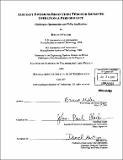Aircraft emissions reductions through improved operational performance : challenges, opportunities and policy implications
Author(s)
Miller, Bruno, 1974-
DownloadFull printable version (7.885Mb)
Other Contributors
Massachusetts Institute of Technology. Technology and Policy Program.
Advisor
John-Paul Clarke.
Terms of use
Metadata
Show full item recordAbstract
Aircraft are a significant source of emissions whose impact on local air quality and global climate change is expected to increase as the aviation industry continues to grow. Operational improvements are an attractive alternative for emissions reductions, because in addition to the environmental benefits, they can reduce airspace congestion, delays and unnecessary fuel consumption. Furthermore, most stakeholders and regulations prefer operational measures over increased stringency or environmental taxes. This thesis estimates emissions reductions through operational improvements by comparing mission time, emissions and fuel consumption for a conservative baseline scenario and for actual aviation activity. Unlike previous efforts, fuel consumption estimates are not based on fleet averages and schedules but are based on actual mission times and aircraft types from the Airline Service Quality Performance (ASQP) database, which contains airline information reported by the ten largest US carriers. Results indicate that fuel bum during ground operations has been growing at a faster rate than operations or total mission time in US domestic aviation and may therefore become a considerable constraint to airport expansion, and that the potential for local emissions reductions through improved surface operations is significant. The results also indicate that significant airborne fuel burn savings may be achieved through operational improvements, but these are not sufficient to offset the growth in aviation emissions. This suggests the need for a comprehensive approach that combines other alternatives, such as increased stringency and market-based mechanisms. A systems engineering approach is recommended to address this complex effort, which must reconcile diverging positions of stakeholders vis-a-vis reductions alternatives and structure a harmonized regulatory framework.
Description
Thesis (S.M.)--Massachusetts Institute of Technology, Technology and Policy Program, 2001. "June 2001." Includes bibliographical references (p. 119-125).
Date issued
2001Department
Technology and Policy ProgramPublisher
Massachusetts Institute of Technology
Keywords
Technology and Policy Program.